Whether you own a bustling office complex, a thriving retail space, or a bustling industrial facility, maintaining a sturdy and reliable roof is crucial for the long-term success of your business.
In this comprehensive guide, we will delve into various aspects of commercial roof replacement, providing you with valuable insights, tips, and essential information to make informed decisions.
Whether you require industrial roof repairs services or a complete industrial roof replacement, we will guide you on finding reputable contractors in your vicinity who specialize in catering to the specific requirements of industrial properties.
By equipping yourself with knowledge about commercial roof replacement services, you can make informed decisions that will contribute to the long-lasting success of your business. So, let’s dive into this ultimate guide and unlock the secrets to ensuring a reliable and robust roof for your commercial or industrial property.
What Does Commercial Roof Replacement Entail?
Commercial roof replacement involves the process of removing the existing roof system of a commercial building and installing a new one.
It is a significant undertaking that requires careful planning, professional expertise, and adherence to local building codes and regulations.
Here are the key steps involved in commercial roof replacement:
1. Inspection and Assessment
A thorough inspection is conducted to evaluate the condition of the existing roof. This includes identifying any structural issues, leaks, or damage that may require repairs or replacement.
2. Planning and Material Selection
Based on the assessment, the appropriate roofing materials are selected for the replacement. Factors such as the building’s location, climate, and budget are taken into account.
Common commercial roofing materials include single-ply membranes (such as TPO, PVC, or EPDM), metal, built-up roofing (BUR), and modified bitumen.
3. Permits and Regulations
Before starting the roof replacement services project, necessary permits and approvals must be obtained from local authorities. Compliance with building codes and regulations specific to commercial roofing is essential.
4. Removal of Existing Roofing
The existing roof materials, including the old membrane, insulation, and any other layers, are carefully removed. This process may involve the use of specialized tools and equipment to ensure safe and efficient removal.
5. Repairing the Substrate
The roof substrate or deck is inspected for any damage or deterioration. Necessary repairs or replacements are performed to ensure a sound foundation for the new roof system.
6. Installation of New Roofing System
The new roofing system is installed based on the chosen materials and design. This includes laying down insulation layers, applying the waterproofing membrane, and securing it with fasteners or adhesives. Flashing, drainage systems, and other components are also installed to ensure proper functionality.
7. Quality Assurance and Inspections
Throughout the installation process, regular inspections are conducted to ensure quality workmanship and compliance with specifications. This may involve moisture testing, leak detection, or thermal imaging to identify any potential issues.
What is the Average Cost of Commercial Roof Replacement?
The average cost of commercial roof replacement can vary widely depending on several factors, including the size and complexity of the roof, the chosen roofing materials, the location of the building, and any additional requirements or features specific to the project.
On average, commercial roof replacement costs can range from $5 to $12 per square foot. This estimate typically includes the removal of the existing roof, installation of new materials, labor costs, and any necessary repairs or modifications to the roof structure. Keep in mind that these figures are approximate and can vary significantly based on the factors mentioned earlier.
It’s important to obtain detailed quotes from roofing contractors who can assess your specific needs and provide accurate cost estimates based on your project requirements.
Additionally, consider budgeting for potential additional expenses, such as permits, insulation upgrades, or any specialized features or equipment needed for your commercial roof replacement.
Factors to Consider before Industrial Roof Replacement
Before proceeding with an industrial roof replacement, several factors should be considered to ensure a successful and cost-effective project. Here are some key factors that are typically taken into account:
1. Roof Condition Assessment
A thorough assessment of the current roof condition is essential. This involves inspecting for signs of damage, leaks, structural issues, and deterioration.
Understanding the overall condition of the roof helps determine whether a replacement is necessary or if repairs can suffice.
2. Roofing Material Selection
Selecting the appropriate roofing material for the industrial roof replacement is crucial. Factors such as durability, longevity, resistance to weather elements, maintenance requirements, and budget must be considered.
Common industrial roofing materials include metal, single-ply membranes (such as TPO, PVC, or EPDM), built-up roofing (BUR), and modified bitumen.
3. Roofing System Design
The design and configuration of the roofing system should align with the specific needs of the industrial facility. Considerations include slope, drainage, insulation requirements, energy efficiency, and any unique features or equipment installations on the roof.
4. Building Codes and Regulations
Compliance with local building codes, regulations, and permits is essential. It is necessary to ensure that the replacement project adheres to safety standards, fire codes, load-bearing requirements, and any other regulations specific to industrial roofs.
5. Budget and Cost Considerations
Establishing a budget for the industrial roof replacement project is vital. It should encompass not only the cost of materials and labor but also any additional expenses such as permits, insulation upgrades, equipment removal, or disposal.
Obtaining detailed quotes from roofing contractors is recommended to have a clear understanding of the overall cost.
6. Business Operations and Downtime
Planning the replacement project to minimize disruption to ongoing operations is crucial for industrial facilities.
Coordinating the project timeline, staging areas, and ensuring worker safety is essential to minimize downtime and maintain productivity.
7. Contractor Selection
Choosing an experienced and reputable roofing contractor specializing in industrial projects is vital. Look for contractors with a proven track record, proper licensing, insurance, and expertise in industrial roof replacement.
How to Choose a Commercial Flat Roof Replacement Contractor?
Choosing the right contractor for your commercial flat roof replacement is crucial to ensure a successful and smooth project.
Here are some key steps to help you select a reputable and qualified contractor:
1. Research and Gather Recommendations
Start by conducting thorough research and gathering recommendations from trusted sources such as friends, colleagues, or industry associations.
Look for contractors who specialize in commercial flat roof replacement and have a solid reputation for quality work.
2. Check Credentials and Experience
Verify the contractor’s credentials, including licenses, certifications, and insurance coverage. A reliable contractor should have the necessary licenses and certifications specific to commercial roofing.
Additionally, assess their experience in handling similar projects and their familiarity with the specific roofing materials you are considering.
3. Review Portfolios and References
Request to see the contractor’s portfolio or past projects that demonstrate their expertise in commercial flat roof replacement. This will give you an idea of the quality of their workmanship and the range of projects they have successfully completed.
Additionally, ask for references and reach out to their previous clients to gather feedback about their experience working with the contractor.
4. Assess Financial Stability
Evaluate the financial stability of the contractor to ensure they have the resources to complete your project. Request financial references or proof of financial stability to gain confidence in their ability to handle the costs and requirements of the project.
5. Request Detailed Proposals
Obtain detailed proposals from multiple contractors outlining the scope of work, materials to be used, project timeline, and cost breakdown. Compare the proposals carefully, ensuring they address all your requirements and specifications. Beware of unusually low bids, as they may indicate subpar materials or workmanship.
6. Communication and Professionalism
Assess the contractor’s communication skills and professionalism. A reliable contractor should be responsive, attentive to your concerns, and able to explain the process clearly.
They should provide you with a point of contact and maintain open lines of communication throughout the project.
7. Warranty and Maintenance Services
Inquire about the warranty provided by the contractor for both materials and workmanship. A reputable contractor will stand behind their work and offer a warranty that covers any potential issues.
Additionally, ask about their post-installation maintenance services to ensure ongoing support and roof maintenance.
8. Contract and Legal Considerations
Once you have selected a contractor, review the contract carefully before signing. Ensure that all project details, including timelines, costs, warranties, and any specific requirements, are clearly outlined in the contract.
Seek legal advice if necessary to ensure you fully understand the terms and conditions.
What Insurance Covers Roof Replacement?
The insurance coverage for roof replacement depends on the type of insurance policy you have. Here are some common insurance policies that may cover roof replacement:
Homeowners Insurance
Homeowners insurance typically covers roof replacement if the damage is caused by a covered peril, such as a storm, fire, or vandalism. It is important to review your policy and understand the specific coverage, including any limitations, deductibles, and exclusions related to roof replacement.
Commercial Property Insurance
Commercial property insurance is designed to protect commercial property owners from various risks, including damage to the building’s structure. If the damage to your proof is caused by a covered event specified in your policy, such as fire, hail, or windstorm, your commercial property insurance may cover the cost of roof replacement.
Business Interruption Insurance
Business interruption insurance is typically designed to cover financial losses due to a temporary shutdown of your business caused by a covered event, such as a fire or natural disaster. While it does not directly cover the cost of roof replacement, if the roof damage leads to a significant disruption in your business operations, resulting in financial losses, business interruption insurance may help compensate for the income lost during the period of interruption.
Commercial Liability Insurance
Commercial liability insurance primarily protects your business against claims for bodily injury or property damage caused by your business operations. It typically does not cover the cost of roof replacement unless the damage was caused by a covered event and resulted in liability claims. However, it’s important to review your specific policy and consult with your insurance provider to understand the coverage details.
Conclusion
In conclusion, when it comes to finding a reliable contractor for your commercial flat roof replacement or repair needs, Mr. Roofer stands out as a trusted and experienced choice.
With a strong track record in the industry, Mr. Roofer is committed to providing quality services and ensuring customer satisfaction.
About Mr Roofer – The Best Commercia Roof Replacement Service Providers in Ohio, KY & WV
When considering commercial flat roof replacement, understanding the cost per square foot is essential. Mr. Roofer offers competitive pricing and transparent cost breakdowns, allowing you to plan your budget effectively. Their expertise in commercial metal roof repair and commercial roof leak repair ensures that your roofing issues are addressed promptly and efficiently.
With a wide range of services, Mr. Roofer caters to various needs, including commercial flat roof repair and industrial roof repairs. Their team of skilled professionals is equipped to handle different roof types and materials, delivering reliable and durable solutions.
In addition to their expertise, Mr. Roofer understands the importance of location convenience. With their presence in multiple areas, including offering services for commercial roof repair near you, they ensure prompt response times and efficient project management.
Whether you require a commercial flat roof replacement, commercial metal roof repair, or industrial roof replacement, Mr. Roofer is committed to delivering high-quality results. Their dedication to customer satisfaction, competitive pricing, and industry expertise make them a reliable choice for your roofing needs.
Contact them today to discuss your requirements and benefit from their reliable services, competitive pricing, and commitment to excellence.
Yes, there are financing options available for commercial roof replacement. Some roofing contractors offer financing programs or can provide information on third-party financing options.
Additionally, you may explore options such as business loans, equipment financing, or leasing arrangements to help fund your roof replacement project. It is advisable to research and compare different financing options to find the one that best suits your needs and financial situation.
In many cases, commercial roofs can be repaired instead of replaced, depending on the extent and nature of the damage. Minor issues such as leaks or small areas of damage can often be repaired.
However, if the roof has extensive damage, is near the end of its lifespan, or has recurring problems, a replacement may be more cost-effective and provide better long-term results.
The lifespan of a commercial roof can vary depending on factors such as the type of roofing materials used, maintenance practices, and weather conditions. On average, commercial roofs may need to be replaced every 20 to 30 years.
The duration of a commercial roof replacement project can vary depending on the size of the roof, the complexity of the installation, and other factors such as weather conditions.
The average cost of commercial roof replacement can vary depending on various factors such as the size of the roof, the type of materials used, and the complexity of the project.
On average, commercial roof replacement costs can range from $5 to $12 per square foot. However, it is important to obtain detailed quotes from roofing contractors to get an accurate estimate based on your specific project requirements.

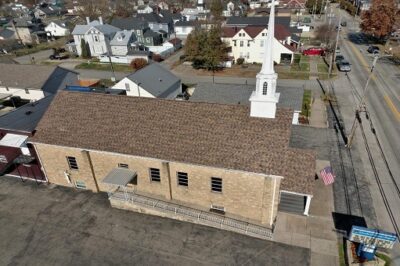

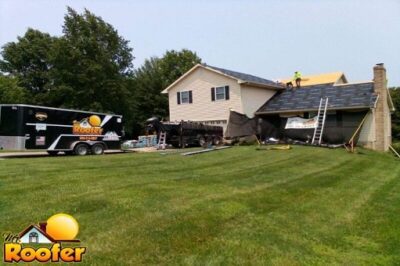
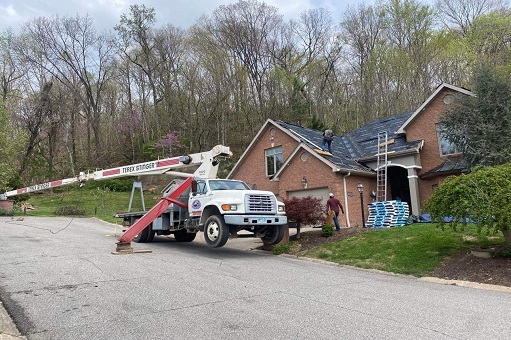
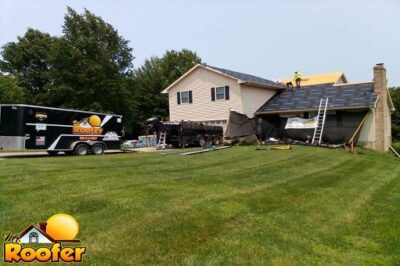
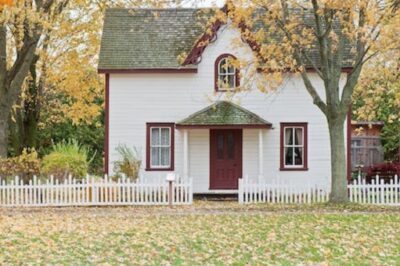
0 Comments